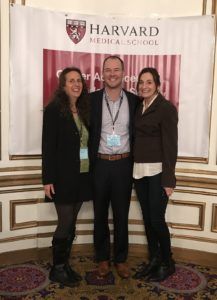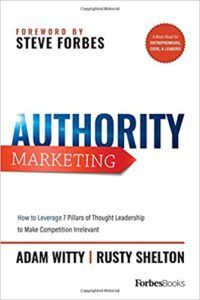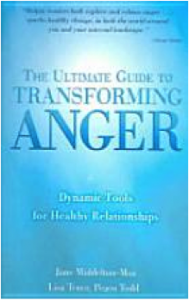
Are You an Authority?
Last November, during a conversation over lunch during Harvard Medical School’s leadership course for women in healthcare, my long-time friend and colleague–and my publicist of over a dozen years–shared ideas with me about what it means to be an authority in one’s field. And why it matters.
This is the subject of his Rusty’s latest book, Authority Marketing, co-authored with Adam Witty and with a foreword by Steve Forbes. We continued the conversation over email that I might share his insights with readers of this blog, published and aspiring nonfiction authors.
Lisa: What’s the distinction between expert and authority? What does it mean to be an authority?
Rusty: It’s incredibly hard to become an expert, as those who have earned their M.D., financial advisory certification or other distinguished degree know. But the reality is that there are more than 400,000 doctors and more than 300,000 financial advisors in the United States. That degree puts you in rarified air but when I go to pick a doctor, dentist or financial advisor, I have a lot of choices and for those looking to drive impact, leads or both, it’s hard to stand out among such numbers.
Authority marketing is combining stand-out expertise with targeted, meaningful visibility that pulls someone out of that commoditized “expert” space and positions them as a visibility thought leader (what we call an authority).
Lisa: And how does one do that?
Rusty: We’ve identified seven pillars of Authority Marketing and they include:
[bctt tweet=”The 7 Pillars of Authority Marketing ” username=”LisaTener”]
- Branding – Do you have a differentiated brand that positions you as an authority? This often starts with a home base website that showcases a mission-driven brand (what’s your cause?) and re-markets media coverage, speaking experience and even a book to build authority by association.
- Lead Generation/Audience Creation – Once you have a differentiated brand in place, the next step is driving engagement with that brand. The best way to do this is by integrating earned media (PR, speaking, referrals, a book, etc.), rented media (social media, advertising, etc.) and owned media (your website, blog and email list) to give yourself leverage to spread your message and/or grow your business.
- Content Marketing – In our book, Mastering the New Media Landscape: Embrace the Micromedia Mindset, we argue that we have entered the age of “Micromedia” in which every individual and brand is a media outlet – whether they know it or not. Success in today’s media landscape means thinking more like the media than a marketer, which is why smart understand they have the same power the media does – to build an audience that looks to them (via a blog, podcast, etc.) as the best source of entertaining and informative content in their topic area.
- Publicity –This is the most sought-after form of earned media for a reason – it provides more immediate authority to you than just about anything available. At the same time, the limiting factor of PR is that someone else has to say “yes” for you to reach an audience, be that a producer, editor or blogger. But even though this category doesn’t give you long-term leverage, it’s an important component for any expert looking to make the jump to authority.
- Speaking – Some argue that speaking is just as powerful an authority-builder as publicity and it’s incredibly important for experts who want to be viewed as thought leaders. To become a visible, successful speaker you must brand yourself as one (even before you may consider yourself “keynote” quality). Think about it – if I get to your website and can’t find a picture of you on stage or access comments from recent audiences, am I really going to think you’re a fit for my conference?
- Events – There is some crossover between this category and speaking but it is a separate pillar because events also include those you own, from open houses to virtual events (webinars and beyond). Events provide significant authority and value to your audience.
- Referral Marketing – Most experts rely only on this category to grow their influence, impact and business, believing that “if I do great work – opportunities will come my way.” There’s no question that you can’t be an authority unless you “have the goods” (meaning that you actually do great work) but the limiting factor of sitting back and waiting on referral is that you don’t have any control over lead generation or audience/impact growth – you have to wait on someone else to talk about you. So, while this is a very important piece of the puzzle – it’s just one of seven pillars.
Lisa: You’ve been in book PR a long time and over time your focus has shifted a bit from just books to this concept of full-service Authority Marketing. Can you say more about why it’s an important strategic perspective for you and your clients?
Rusty: We still do a lot of PR work at Zilker Media but the reality is that PR is just one (very important) piece of the puzzle in today’s media landscape. Our clients need us to have a plan in place to integrate earned, rented and owned media so that the media interview they do or the article they write drives people toward meaningful action that either grows their impact, markets their book or builds their business. Specifically, we have found that driving audiences toward a free quiz or assessment (interactive content) is the best way to provide value and engagement around a cause. Booking the interview is in fact just the first step and those who end the work there are leaving a lot of value untapped.
It’s All About the Book
Lisa: When we saw each other last year at the Harvard Medical School course for women in healthcare leadership, you mentioned that for women in healthcare, and leadership in general, you’ve seen books as the biggest way these women have “moved the dial” in terms of their authority in their field. Can you say more about why that is and what you mean?
 Rusty: Right or wrong, in our culture we assign almost an irrational amount of authority to someone who has written and published a book. A book legitimizes ideas, establishes thought leadership, provides prestige and allows someone to communicate their message at scale. It also makes each of the seven pillars above much easier to do. Here’s a snapshot of that:
Rusty: Right or wrong, in our culture we assign almost an irrational amount of authority to someone who has written and published a book. A book legitimizes ideas, establishes thought leadership, provides prestige and allows someone to communicate their message at scale. It also makes each of the seven pillars above much easier to do. Here’s a snapshot of that:
- Brand – When I arrive at someone’s website I may not know who they are, but as soon as I see their name on the front of a book I immediately assign authority to them (authority by association)
- Lead Generation/Audience Creation – A book is a great way to build an audience and drive lead flow.
- Content Marketing – A book is perhaps the most tangible and iconic form of content marketing thanks to its staying power (no one discards a book).
- Publicity – A book makes getting publicity much easier.
- Speaking – A book legitimizes a speaker and provides a great takeaway for audience members.
- Events – A book launch is a great reason to host an event, be it a book signing or webinar.
- Referral Marketing – Giving away your book to your biggest fans provides them the easiest and most comfortable way to refer you.
Lisa: Yes, I can think of so many examples of all seven pillars working for my clients with their books. What are some of the changes you’ve seen in the PR landscape over the past year or two? Where should authors and experts be putting their energy?
[bctt tweet=”Changes in the PR Landscape: Where to Put Your Energy ” username=”LisaTener”]
Rusty: Wow, where should I start? I think the biggest opportunity for authors and experts is the magic of using a quiz or assessment to drive engagement, education and growth of their email list. I call this quiz marketing and have been so convinced by the success of client quizzes in recent years that I joined with a few partners recently to build Catch Engine, which is a software platform for those who want to feature a quiz or assessment on their website.
When it comes to email growth, lead magnets typically fall into one of three categories:
- Old faithful – “Click here to sign up for news and updates” (this converts at a horrific rate)
- Gift marketing – “Click here to download my free e-book or whitepaper” (this converts well if you’re well known and poorly otherwise)
- Interactive content – “Click here to see how confident you are – take the confidence quiz” (177,000 people have taken this quiz over the past three years – and counting)
Our system, Catch Engine, is great but whatever software system you use – there’s nothing I can say that will be more impactful for your audience than considering adding interactive content to their website – it will make an immediate impact.
Lisa: Now that Facebook and Twitter are tending to require payment for ads for most posts to show up, is it still beneficial to be on those platforms? What are the considerations? How much time and effort should one put into those platforms? What can one expect?
Rusty: The decline in organic visibility (non-paid reach) across social media has been a wake up call to many and serves as an important reminder that your social media channels are “rented media.” In other words, when you build an audience on your Facebook page, LinkedIn profile, Twitter account, etc – you’re building an audience on real estate you don’t own, which means you can only reach that audience at the behest of the owner of that real estate (which gives them all the leverage).
Lisa: I agree wholeheartedly. It makes me nervous when I work with an aspiring author, and authority, and all their engagement is on facebook, for example, and not their website or blog.
Rusty: That doesn’t mean I don’t recommend actively using social media – it just means that you have to always be focused on doing two things:
- Delivering great value with entertaining and/or informative content
- Giving those you reach a reason to leave that social media channel and head to your website so you can “own” the connection to them once they join your email list.
I should also add that a smart, well-targeted Facebook advertising campaign is one of the best possible ways money can be spent in a marketing campaign…with one caveat – the call to action or lead magnet must actually give value (hint: a great quiz!).
Lisa: In our conversation over lunch you encouraged me to blog or write articles on LinkedIn. Can you say more about that strategy for our blog readers, to help them with their platform and authority?
Rusty: You’ve been doing a great job of extending your content over to LinkedIn – I always enjoy it! LinkedIn has recently opened up the ability for anyone to publish “long-form” content on their platform. That means you can have a blog within your LinkedIn profile and, once you start posting, LinkedIn opens up the ability for you to build a separate audience from your more formal connections – followers. One way LinkedIn is encouraging its members to post long-form content is by giving sizable organic reach to such posts. So, we have a window in time right now where your readers can get extra value by contributing content there.
Lisa: What are some visibility and authority strategies that are working especially well for your clients right now? (examples would be great and we can link).
Rusty: I have talked so much in this post about quiz-marketing – let me link to a few of our most successful quizzes:

Lisa: Thanks, Rusty. It sounds to me like some of the biggest takeaways are, if you want to stand out as an authority (for all the benefits you mentioned earlier):
a) Write a book (my favorite, of course).
b) Offer something engaging and valuable to people, like a quiz.
c) Use rented media, like social media, to bring people to your website, where you can offer them both a) and b)!
And I love your list of the 7 pillars. While I wholeheartedly recommend writing a book to many experts or those who have a message to share, I also encourage readers to think about the 7 pillars you mention. These are ways to reach people and have impact before you even complete your book, and they will help your book be successful!
[bctt tweet=”Join Us at Harvard! ” username=”LisaTener”]
Readers, Rusty and I will both be teaching at Harvard Medical School’s Career Advancement and Leadership Skills for Women in Healthcare this November. There, you can learn more from Rusty about Authority Marketing. Also, I’ll be teaching a workshop on honing your expert bio, as well as offering an advanced class on How to Write and Publish a Book to Support Your Mission and Work. The course sells out every year, so be sure to register early if you are interested!



Do you have a link to register for this specific workshop on honing your expert bio, as well as offering an advanced class on How to Write and Publish a Book to Support Your Mission and Work. Thank you.
Hi Krista,
I think you need to sign up for the whole course to attend. Here is the link to register. I’d love to see you there!
https://womensleadership.hmscme.com/registration-information